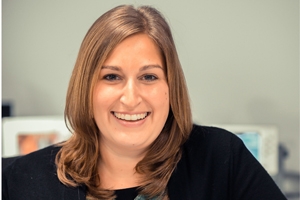Business
After the Storm: AU Alumna Leads Houston Jewish Group Post-Hurricane Harvey

When Hurricane Harvey battered Houston, the city's Jewish community was hit particularly hard. Approximately 2,000 Jewish homes were flooded, while supporting networks like synagogues suffered considerable damage. As the vibrant community withstood—and picked up the pieces from—the hurricane's wrath, Avital Ingber, Kogod/BA '03, was transitioning into a new job.
After accepting her post as president and CEO of the Jewish Federation of Greater Houston, she was still in DC but in frequent contact with her new Texas colleagues. By the time she officially started in November 2017, two things became abundantly clear: Both the city of Houston, and her new job, were fundamentally changed. "I had to make decisions a lot quicker than I would have before," says Ingber. "We're balancing onboarding me to the community, and being a new CEO, with moving forward with the disaster recovery."
While assisting Houston's Jewish population, she's mindful of leadership and organizing lessons she learned as an undergrad at American University.
One Community, One Voice
The Jewish Federation of Greater Houston is now immersed in recovery issues. But the storm has also given the organization reason to reassess the community's long-term viability.
"Our biggest concern is the sustainability of Jewish life. So, in the fourth largest city in America, we don't want to have a generation that is lost in terms of its connection to the Jewish community," Ingber says.
Among flooded families, payments of synagogue dues are lagging, and officials anticipate fewer enrollments at Jewish day schools. To compensate, the Jewish Federation of Greater Houston is giving scholarships to help strengthen the local Jewish experience. And, despite the area's struggles, Ingber believes rebuilding efforts are uniting Jews in Houston and beyond.
"Harvey has not only brought the Jewish community of Houston closer together, it has brought the Jewish community of North America closer together. Everyone who's come here from other communities feels that, 'Houston is not needy. Houston is in need. And this could be us.' They want to help because they know we'll be there if they unfortunately have a natural disaster or a man-made disaster," she explains. "We are now talking about a purposeful rebuild. We're thinking about advocacy and community organizing, and how we come out with one voice."
Roots and Staying Connected
Ingber's family instilled in her the importance of communal ties and civic engagement. Her paternal grandparents were Holocaust survivors who relocated to Canada. Her maternal grandparents emigrated from Russia to Canada at the turn of the century, and Ingber's grandmother was active in Montreal's Jewish community. She was named campaigner of the year for Federation CJA (Montreal's Jewish federation) in the 1970s, and that award still hangs in Ingber's Houston office. Soon after Ingber started her position, her grandmother passed away at 95.
"The fact that here I am working for the same organization that she volunteered for is, I think, really remarkable," Ingber says.
Her parents came from Canada to Cincinnati, Ohio—making Ingber a first-generation American—and her father, Abie, became a rabbi. He now runs the Center for Interfaith Community Engagement at Xavier University.
"I grew up going to Jewish summer camps. I was very active in BBYO, a Jewish Youth group," she says. "And I knew from a very young age how important it was to give back."
She moved to DC to attend AU, earning her bachelor's degree in marketing and finance with a minor in Jewish studies. She was heavily involved in Jewish issues on campus, including serving on the university Hillel board. But she also did Capitol Hill and marketing internships, and she assumed she'd work in the secular business world after graduation. Yet two years into her career, she felt disconnected from her roots. At the advice of a mentor, she did an informational interview at the Jewish Federation of Greater Washington.
"I showed up and said, 'I'm not looking for a job. I'm just looking to connect with the Jewish community.' And they said, 'OK, well, let's talk.' And three days later, they had created a job for me doing youth outreach," she says. There were thousands of young people, like Ingber, hoping to plug into Jewish life. She stayed at the Jewish Federation of Greater Washington for 13 years, serving in various capacities and eventually becoming chief development officer.
Still cherishing her AU education, she got to know Robert and Arlene Kogod years later while working in Washington. "I remember distinctly the first time that I got to meet them, and the fact that I could go up and say, 'Thank you for allowing me to have this incredible learning experience at the Kogod School of Business,'" she recalls.
Hard Times and Generosity
The Jewish Federation of Greater Houston recruited Ingber, and her time there has been anything but ordinary.
"We cry a lot together. It's hard, and there've certainly been challenges. And my job is to be part of a Jewish community, so people have reached out to me and invited me to their homes," she notes. "The Houston community is one of the most warm and welcoming communities that I have ever experienced."
Passover starts at the end of the month. Several large Houston synagogues are hosting still-displaced residents for local Seders. Ingber will visit her sisters and family in New York City for Passover before returning to Houston for work. It's seeing old family—and connecting with her new one.